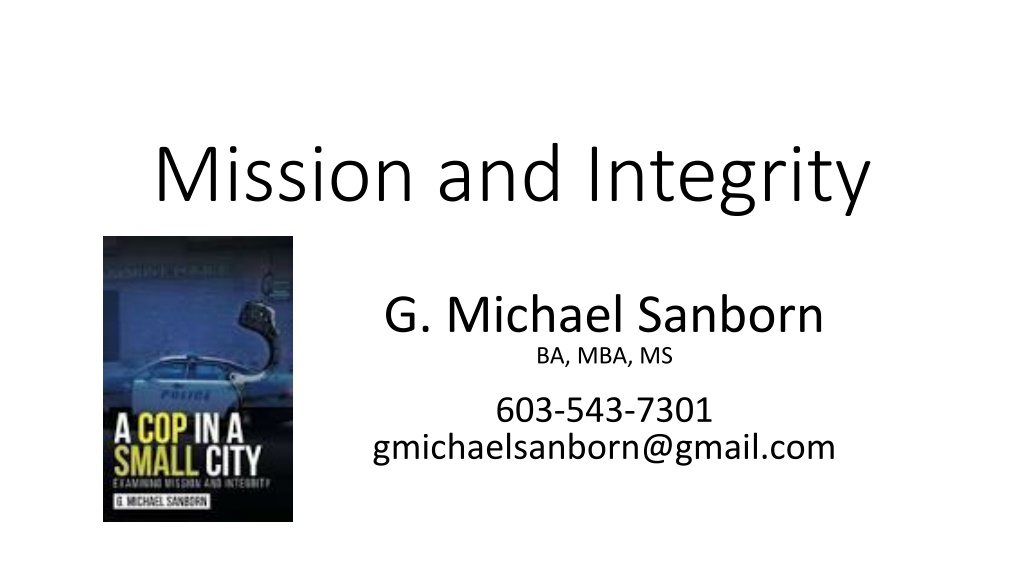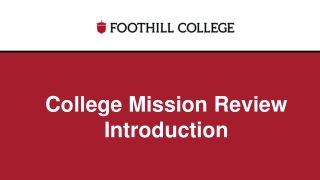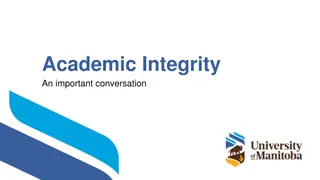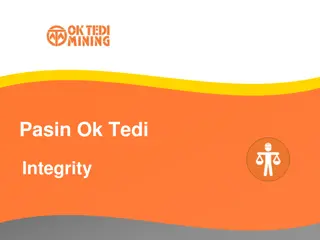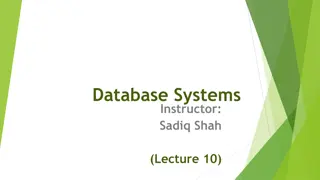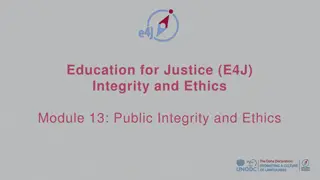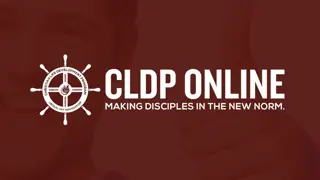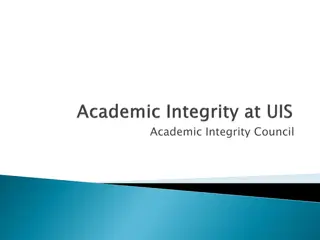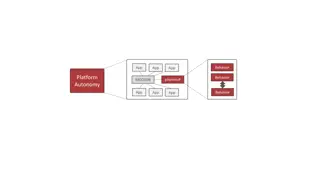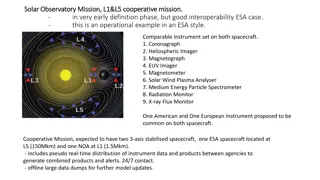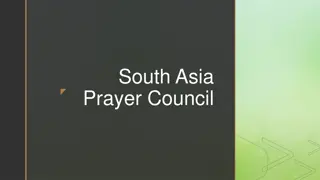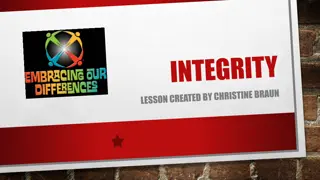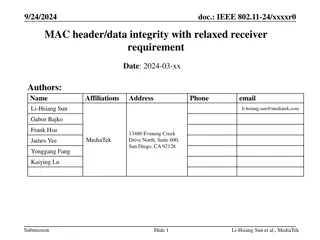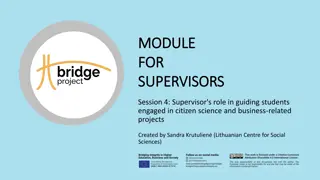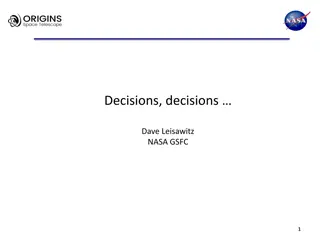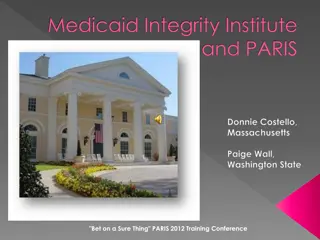Mission and Integrity
Explore the concepts of mission, integrity, ethics, and bias, essential for ethical decision-making. Delve into the meanings and importance of these principles in guiding behavior and decision-making processes.
Download Presentation

Please find below an Image/Link to download the presentation.
The content on the website is provided AS IS for your information and personal use only. It may not be sold, licensed, or shared on other websites without obtaining consent from the author.If you encounter any issues during the download, it is possible that the publisher has removed the file from their server.
You are allowed to download the files provided on this website for personal or commercial use, subject to the condition that they are used lawfully. All files are the property of their respective owners.
The content on the website is provided AS IS for your information and personal use only. It may not be sold, licensed, or shared on other websites without obtaining consent from the author.
E N D
Presentation Transcript
Mission and Integrity G. Michael Sanborn BA, MBA, MS 603-543-7301 gmichaelsanborn@gmail.com
Mission Mission noun 1. a group or committee of persons sent to foreign country to conduct negotiations, establish relations, provide scientific and technical assistance, or the like. 2. the business with which such a group is charged. 3. any important task or duty that is assigned, allotted, or self- imposed: Our mission is to find the child a safe home. 4. an important goal or purpose that is accompanied by strong conviction; a calling or vocation: She has finally found her mission in life. dictionary.com
Integrity Integrity noun 1. adherence to moral and ethical principles; soundness of moral character; honesty. 2. the state of being whole, entire, or undiminished: to preserve the integrity of the empire. 3. a sound, unimpaired, or perfect condition: the integrity of a ship's hull. dictionary.com
Ethics Ethics noun 1. (used with a singular or plural verb) a system of moral principles: the ethics of a culture. 2. (used with a plural verb) the rules of conduct recognized in respect to a particular class of human actions or a particular group, culture, etc.: medical ethics; Christian ethics. 3. (used with a plural verb) moral principles, as of an individual: His ethics forbade betrayal of a confidence. 4. (used with a singular verb) that branch of philosophy dealing with values relating to human conduct, with respect to the rightness and wrongness of certain actions and to the goodness and badness of the motives and ends of such actions. dictionary.com
Moral Moral adjective 1.of, relating to, or concerned with the principles or rules of right conduct or the distinction between right and wrong; ethical: moral attitudes. 2.expressing or conveying truths or counsel as to right conduct, as a speaker or a literary work. 3.founded on the fundamental principles of right conduct rather than on legalities, enactment, or custom: moral obligations. 4.capable of conforming to the rules of right conduct: a moral being. noun 1.the moral teaching or practical lesson contained in a fable, tale, experience, etc. 2.the embodiment or type of something. dictionary.com
Bias Bias noun 1. a particular tendency, trend, inclination, feeling, or opinion, especially one that is preconceived or unreasoned: illegal bias against older job applicants; the magazine s bias toward art rather than photography; our strong bias in favor of the idea. 2. unreasonably hostile feelings or opinions about a social group; prejudice: accusations of racial bias. 3. an oblique or diagonal line of direction, especially across a woven fabric. 4. Statistics. a systematic as opposed to a random distortion of a statistic as a result of sampling procedure. dictionary.com
Professionalism Professionalism noun 1. professional character, spirit, or methods 2. the standing, practice, or methods of a professional, as distinguished from an amateur dictionary.com
Profession Profession noun 1. a vocation requiring knowledge of some department of learning or science: the profession of teaching. Compare learned profession. 2. any vocation or business. 3. the body of persons engaged in an occupation or calling: to be respected by the medical profession. 4. the act of professing; avowal; a declaration, whether true or false: professions of dedication. 5. the declaration of belief in or acceptance of religion or a faith: the profession of Christianity. 6. a religion or faith professed. dictionary.com
Code Code noun 1. a system for communication by telegraph, heliograph, etc., in which long and short sounds, light flashes, etc., are used to symbolize the content of a message: Morse code. 2. a system used for brevity or secrecy of communication, in which arbitrarily chosen words, letters, or symbols are assigned definite meanings. dictionary.com
Rat Rat noun 1. any of several long-tail rodents of the family Muridae, of the genius Rattus and related genera, distinguished from mouse by being larger 2. any of various similar or related animals. Slang. a scoundrel. interjection rats (an exclamation of disappointment, disgust, or disbelief.) verb (used without object), rat ted, rat ting. Slang. 1. to desert one's party or associates, especially in a time of trouble. 2. to turn informer; squeal: He ratted on the gang, and the police arrested them. 3. to work as a scab. 4. to hunt or catch rats. dictionary.com
Integrity Discussion Scenarios From A Cop in a Small City: Examining Mission and Integrity Officer Kent and Benny speeding Officer Grant and Mitch Mitch, convicted felon with a gun Dispatcher Gary with Sam Officers Martin and Jacob at Freelancers Party Trooper Walt speeding Newport officer speeding Officer Jack and Tom with Trooper motorcycle chase
Organization Development is the attempt to influence the members of an organization to expand their candidness with each other about their views of the organization and their experience in it, and to take greater responsibility for their own actions as organization members. The assumption behind Organization Development is that when people pursue both of these objectives simultaneously, they are likely to discover new ways of working together that they experience as more effective for achieving their own and their shared (organizational) goals. And that when this does not happen, such activity helps them to understand why and to make meaningful choices about what to do in light of this understanding. -- Neilsen, Becoming an Organization Development Practitioner , Englewood Cliffs, CA: Prentice- Hall, 1984, pp. 2-
Self Care Positive Connections Effective Mentor
